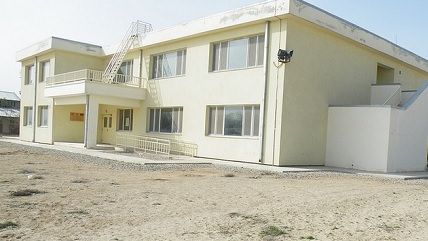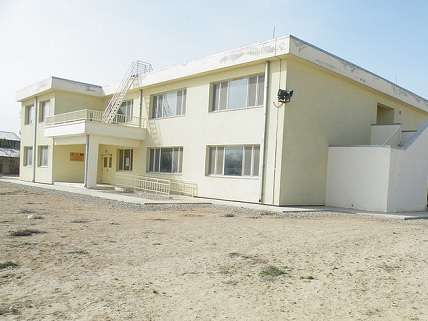Nothing Left to Cut: DOD Only Used 59 Percent of "Commander's Emergency" Appropriations in Last Five Years, Left $156.5 Million Unspent, Asking for $60 Million Next Year, Inspector General for Afghanistan Spending Says
Winding down the war but trying to spend more


The Defense Department's special inspector general for Afghan reconstruction (SIGAR) released two more items today on wasteful U.S. spending in Afghanistan; a teaching facility USAID has awarded about $3 million in contracts to an Iraqi and multiple Afghan firms to build and repair that remains unusable according to a new report (pdf), and a "Commander's Emergency Response Program" (CERP) for which Congress appropriated money that was left unspent.
The inspector general says only $43.5 million out of $200 million that expired in September was spent, and that over the last six fiscal years, only 59 percent of allocated funds were used. In a letter to the ISAF commander, the DOD comptroller, and the secretary of the army, the inspector general asks whether the unspent money was "reprogrammed for other purposes or returned to the U.S. Treasury," as well as why the department requested $60 million for the 2014 fiscal year. Congress "only" appropriated $30 million, spending more money where it's already spent money that hasn't been spent yet. The letter also asks why the money wasn't spent through the program for which it was allocated, and suggest some answers:
"There are likely many reasons why these funds were not used. For example, the accelerated U.S. troop drawdown may have reduced the need for these funds, or military commanders may have reduced the cost of various projects through effective oversight. Another factor may have been the overarching challenge of budgeting for small-scale reconstruction projects in an unpredictable conflict zone plagued by violence, corruption, and sustainability challenges"
Read the rest of the letter here.
More Reason on Afghanistan here.
Editor's Note: As of February 29, 2024, commenting privileges on reason.com posts are limited to Reason Plus subscribers. Past commenters are grandfathered in for a temporary period. Subscribe here to preserve your ability to comment. Your Reason Plus subscription also gives you an ad-free version of reason.com, along with full access to the digital edition and archives of Reason magazine. We request that comments be civil and on-topic. We do not moderate or assume any responsibility for comments, which are owned by the readers who post them. Comments do not represent the views of reason.com or Reason Foundation. We reserve the right to delete any comment and ban commenters for any reason at any time. Comments may only be edited within 5 minutes of posting. Report abuses.
Please to post comments


Adjusted for inflation the US spent around $563 Billion (2013 dollars) on defense at the height of the Reagan build up in 1986. In 2013 the US spent over $700 billion on defense and got much less to show for it. The amount of fraud waste and corruption in DOD is staggering. And neither side is willing to do anything about it. The GOP is happy to salute the flag and let their cronies steal at the expense of readiness and the DNC doesn't even care about readiness and is happy to allow the stealing to go on as long as they are able to cut spending to use the money elsewhere.
This may be a stupid question, but why is an American government agency spending money in Afghanistan in the first place?
That is quite a good question. At what point are we going to realize that anyone in Afghanistan who wants a western way of life leaves? The Afghans are happy to take our money. But they have no interest in having the country we are trying to build for them.
Maybe a different approach is in order.
military commanders may havereduced the cost of various projects through effective oversight
Hah hah hah!!!
Another factor may have been the overarching challenge of budgeting for constructing small-scale reconstruction projects in anunpredictable conflict zone plagued by violence, corruption, and sustainability challenges
And yet we are tasked with disposing of billions of dollars worth of 'excess' (stuff we bought for the war that we will still need for a very long time). but to save money on storage costs (pennies), we will dispose of billions of dollars worth of parts and equipment... only to have to turn around and buy it all again in 6-10 years down the road. Probably from the same people who get it off of surplus for pennies on the dollar.
Leadership calls it "savings".
only to have to turn around and buy it all again in 6-10 years down the road.
It is almost as if the defense contractors are running things or something.
It's being driven by Army Materiel Command.
as someone fiscally libertarian, I am infuriated. Most of us are very upset about this, knowing we are just flushing money down the toilet.
but some SES or General has to make his records "look good". Because throwing away billions of dollars of stuff you're going to eventually need saves money, apparently.
A lot of the insanity in government is driven by fiscal law. You have all of these different pots of money. The classic example of this is how maintenance money comes from a different pot than construction money. So a government installation will not have the money to maintain a building but then be able to get the money to build a new one at 10 times the price of just fixing the old one. Another good one is how money not spent by the end of the fiscal year goes away. So every September every government office goes on a spending spree buying shit it really doesn't need because the money is only good for a year. And if you don't use it, your budget will get cut next year.
How many business run on a one year budget and have the attitude that if it isn't spent this year it is gone? It is just insane.
Yup, it really is insane the way it is run. But we're not talking about billions of dollars in assets that you have to basically "pay for" year after year. Yes, there are holding costs involved, but these are held in government facilities. They are not going to just start shutting down supply depots across the country. Sure, they may start laying people off. But they still need to keep the lights on and maintain the buildings.
So if the Army saves holding costs by disposing of billions of dollars in excess inventory, DLA will find fewer dollars. Well, considering you still have to maintain the facilities, they'll charge more for holding costs. We might save a little, but the price on what we do have will go up.
And, as I've mentioned before, because demand for these items will eventually reach the point where we are no longer in excess and need to buy/repair these things again, we'll spend a lot of money trying to start up repair lines again and set up procurement contracts. We spent more than we saved.
But government logic is this... better to save $1 today and spend $100 tomorrow than it is to just spend that $1 now and save that $100 tomorrow. Because, as you said, that money is appropriated year by year. And it's tax payer/debt money. So who needs to be responsible with it?
The same thing happened with BRAC. Back in the day I worked on the closing of an Army Hospital out in Denver. The Hospital cost the army around $50 million dollars a year to run. Closing it cost around $4 Billion. It will be 80 years or more before the cost of closing it is paid for in saved yearly money. Meanwhile, there were some advantages to keeping it open. A lot of retired military had chosen Denver to retire to because of there being a hospital there. All those people got fucked royally. Also, shortly after it closed, 911 happened and all of the sudden Army hospital space got a lot more scarce. Then there is the whole problem with concentrating all of your military assets in one place where it can be easily targeted by terrorists or our enemies.
But that didn't stop DOD from closing it and a lot of other places. They got what amounted to free BRAC money from Congress and were able to save the cost of operating those places out of their O&M money. From the taxpayer prospective and really from the larger national defense prospective BRAC was a really stupid idea. But from DOD's skewed prospective, it was great.
Yeah, save money here but costs more there. But all they care about is the savings in one place. As long as the General or SES can look good by saying "I saved this much money by executing this plan. Give me a raise/promotion."
"Amazing how much money y'all save, yet the deficit keeps growing. Math be crazy."
"...Another good one is how money not spent by the end of the fiscal year goes away. So every September every government office goes on a spending spree buying shit it really doesn't need ... And if you don't use it, your budget will get cut next year."
FWIW - this is a feature common to many large bureaucracies, and not just Government- although I am aware the scale of stupid just gets vastly more profound in the public sector.
But most corporate organizations like r&d, marketing, find ways to evade any real regular measurement of ROI, and are viciously territorial about their budgets to the point of being institutionally counterproductive. as you mention = one department may be running out of money for an important task, but the other will blow a huge sum on some totally unneeded project simply to ensure they get their line-item budget renewed every year.
Everyone hates corporate consultants. I know. but the reason they exist is to point out obvious things like this to management, and allow them to make 'unpopular' cuts/restructuring while avoiding direct blame.
Then of course, the departments hire more consultants to fight back; and lo, many powerpoints are made.
Hey, its a living. And yes, I know its even worse in Govt.
That is a good point Gilmore. It is amazing how bureaucracies, public or private, exhibit common behaviors and incentives.
The only thing that saves us from the bureaucracy is its inefficiency.
156.5 million unspent? Right. That's believable. That money, if it hasn't found its way into someones pocket, will find its way into someones pocket.
By the way - the real lesson of this to the various departments tasked with spending this money is, "YOU FUCKED UP =YOU SHOULD HAVE SPENT ALL OF THIS MONEY AND NOW I HAVE TO ANSWER QUESTIONS ABOUT WHY YOU DIDNT."
First rule of a bureaucracy = Never have enough money. 'Not spending' is a cardinal sin. It makes everyone else look bad. It creates more paperwork. Questions are asked. Like, 'where's the rest of it'? And let's look at what you did spend it on now.' Really, there's nothing good about it at all.
Also, being the guy whose job it is to blow money in Afghanistan? Jesus. What did he turn down to get *that* gig?